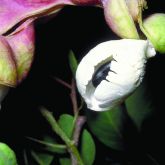Madras thorn
Alert
Have you seen Madras thorn?
Be on the lookout for Madras thorn and report it to Biosecurity Queensland. Early detection and reporting are the key elements in preventing Madras thorn from becoming a major problem in Queensland.
Call us on 13 25 23.

Madras thorn seed
© Gerald D Carr

Madras thorn leaves
© Gerald D Carr

Madras thorn stem and thorns
© Paul Zborowski

Madras thorn variegated form
© Paul Zborowski
Native to a large region of America (from southern California to Columbia and Venezuela), madras thorn is a fast-growing tree that is generally planted as an ornamental. Uncontrolled populations of madras thorn can form dense thickets and out-compete native vegetation and pasture.
Madras thorn is rare in Queensland, possibly restricted to gardens. An opportunity exists to prevent it becoming a serious problem here. To achieve this, madras thorn must not be sold or grown as a garden ornamental anywhere in the state.
You must manage the impacts of madras thorn on your land.
You must not give away, sell or release madras thorn into the environment.
You must report all sightings to Biosecurity Queensland within 24 hours.
Scientific name
Other names
- Manila tamarind
Description
- Attractive fast-growing tree up to 20m tall.
- Most specimens have pair of short, sharp spines at base of each leaf.
- Flowers are small white heads, 1cm in diameter.
- Mature seed pods are pinkish.
- Seeds are numerous.
Habitat
- Tolerates drought.
- Grows on poor soils in dry climates and along coastlines, including areas where roots are in brackish or salt water.
Distribution
- Rarely found in Queensland, possibly confined to gardens.
Life cycle
- Propagation is by seed or cuttings.
- Germination takes 1-2 days.
Impacts
Environmental
- Forms dense thickets.
- Out-competes desirable native vegetation.
Economic
- Invades pasture.
- Can spread quickly across vast tracts of tropical and subtropical areas, and become costly to agriculture and the environment.
How it is spread
- Spreads by seeds or cuttings.
Prevention
Control
- Call 13 25 23 if you find a plant you suspect may be madras thorn to seek advice on control options.
Legal requirements
- Madras thorn is a category 2, 3, 4 and 5 restricted invasive plant under the Biosecurity Act 2014.
- All sightings of madras thorn must be reported to Biosecurity Queensland within 24 hours of the sighting.
- You must not keep, move, give away, sell, or release into the environment. Penalties may apply.
- You must take all reasonable and practical measures to minimise the biosecurity risks associated with dealing with madras thorn under your control. This is called a general biosecurity obligation (GBO).
- At a local level, each local government must have a biosecurity plan that covers invasive plants in its area. This plan may include actions to be taken on madras thorn. Some of these actions may be required under local laws. Contact your local government for more information.
Further information
- Contact the Customer Service Centre
- View the madras thorn fact sheet (PDF, 3.3MB)